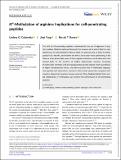Nα-Methylation of arginine: Implications for cell-penetrating peptides
Author(s)
Calabretta, Lindsey O; Yang, Jinyi; Raines, Ronald T
DownloadPublished version (865.6Kb)
Publisher with Creative Commons License
Publisher with Creative Commons License
Creative Commons Attribution
Terms of use
Metadata
Show full item recordAbstract
The field of cell-penetrating peptides is dominated by the use of oligomers of arginine residues. Octanol-water partitioning in the presence of an anionic lipid is a validated proxy for cell-penetrative efficacy. Here, we add one, two, or three N-methyl groups to Ac-Arg-NH2 and examine the effects on octanol-water partitioning. In the absence of an anionic lipid, none of these arginine derivatives can be detected in the octanol layer. In the presence of sodium dodecanoate, however, increasing N-methylation correlates with increasing partitioning into octanol, which is predictive of higher cell-penetrative ability. We then evaluated fully Nα -methylated oligoarginine peptides and observed an increase in their cellular penetration compared with canonical oligoarginine peptides in some contexts. These findings indicate that a simple modification, Nα -methylation, can enhance the performance of cell-penetrating peptides.
Date issued
2022-12-09Department
Massachusetts Institute of Technology. Department of ChemistryJournal
Journal of Peptide Science
Publisher
Wiley
Citation
Calabretta, Lindsey O, Yang, Jinyi and Raines, Ronald T. 2022. "Nα-Methylation of arginine: Implications for cell-penetrating peptides." Journal of Peptide Science.
Version: Final published version